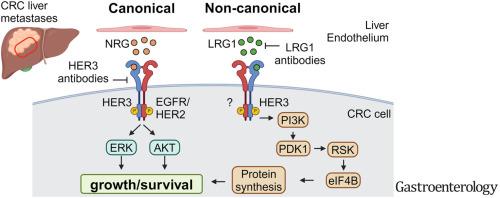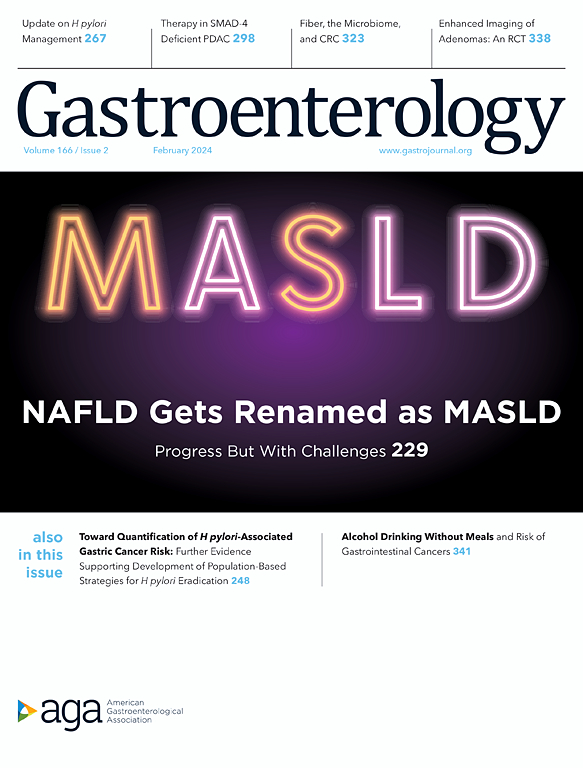LRG1 通过 HER3 信号促进转移性结直肠癌的生长
IF 25.7
1区 医学
Q1 GASTROENTEROLOGY & HEPATOLOGY
引用次数: 0
摘要
背景和目的转移性结直肠癌(mCRC,80%发生在肝脏)患者的治疗失败仍是一项重大挑战。临床前研究表明,HER3 可促进 CRC 细胞存活,但阻断神经胶质蛋白诱导的典型 HER3 信号传导的疗法在临床上收效甚微。最近的研究表明,肝脏微环境通过激活 HER3 以一种不依赖于神经鞘磷脂的方式促进 CRC 生长,因此阐明这些机制可能会揭示治疗 mCRC 患者的新策略。我们进行了蛋白质组分析,以确定引发 CRC 中非典型 HER3 激活的 EC 分泌因子,并利用不同的小鼠 mCRC 模型确定其对 mCRC 的后续影响。结果我们证明,EC分泌的富亮氨酸α-2-糖蛋白1(LRG1)与HER3直接结合并激活HER3,促进CRC生长,而与HER3配体神经胶质蛋白不同。通过基因敲除或中和抗体阻断宿主来源的 LRG1 会抑制 mCRC 在肝脏中的生长,并延长小鼠的存活时间。我们发现PI3K-PDK1-RSK-eIF4B轴激活的蛋白质合成是LRG1-HER3相互作用下游的生物学相关信号级联,而之前临床试验中失败的传统HER3特异性抗体无法阻断这一级联。LRG1-HER3信号轴有别于传统的HER3信号转导,是治疗mCRC患者和其他潜在肝转移类型患者的新疗法。本文章由计算机程序翻译,如有差异,请以英文原文为准。

LRG1 promotes metastatic colorectal cancer growth through HER3 signaling
Background and aims
Therapy failure in patients with metastatic colorectal cancer (mCRC, ∼80% occur in the liver) remains an overarching challenge. Preclinical studies demonstrated that HER3 promotes CRC cell survival, but therapies blocking the neuregulin-induced canonical HER3 signaling have made little impact in the clinic. Recent studies suggest that the liver microenvironment promotes CRC growth by activating HER3 in a neuregulin-independent fashion, thus elucidation of these mechanisms may reveal new strategies for treating patients with mCRC.Methods
Patient-derived primary liver endothelial cells (ECs) were used to interrogate EC-CRC crosstalk. We conducted proteomic analysis to identify EC-secreted factor(s) that triggers non-canonical HER3 activation in CRC, and determined the subsequent effects on mCRC using diverse murine mCRC models. In vitro studies with genetic and pharmacological interventions were used to map the non-canonical HER3 pathway.Results
We demonstrated that EC-secreted leucine-rich alpha-2-glycoprotein 1 (LRG1) directly binds and activates HER3 and promotes CRC growth distinct from neuregulin, the canonical HER3 ligand. Blocking host-derived LRG1 by gene knockout or a neutralizing antibody impaired mCRC outgrowth in the liver and prolonged mouse survival. We identified protein synthesis activated by the PI3K-PDK1-RSK-eIF4B axis as the biologically relevant signaling cascade downstream of the LRG1-HER3 interaction, which was not blocked by conventional HER3-specific antibodies that failed in prior clinical trials.Conclusions
LRG1 is a novel HER3 ligand and mediates liver-mCRC crosstalk. The LRG1-HER3 signaling axis is distinct from canonical HER3 signaling and represents a new therapeutic opportunity to treat patients with mCRC, and potentially other types of liver metastases.求助全文
通过发布文献求助,成功后即可免费获取论文全文。
去求助
来源期刊

Gastroenterology
医学-胃肠肝病学
CiteScore
45.60
自引率
2.40%
发文量
4366
审稿时长
26 days
期刊介绍:
Gastroenterology is the most prominent journal in the field of gastrointestinal disease. It is the flagship journal of the American Gastroenterological Association and delivers authoritative coverage of clinical, translational, and basic studies of all aspects of the digestive system, including the liver and pancreas, as well as nutrition.
Some regular features of Gastroenterology include original research studies by leading authorities, comprehensive reviews and perspectives on important topics in adult and pediatric gastroenterology and hepatology. The journal also includes features such as editorials, correspondence, and commentaries, as well as special sections like "Mentoring, Education and Training Corner," "Diversity, Equity and Inclusion in GI," "Gastro Digest," "Gastro Curbside Consult," and "Gastro Grand Rounds."
Gastroenterology also provides digital media materials such as videos and "GI Rapid Reel" animations. It is abstracted and indexed in various databases including Scopus, Biological Abstracts, Current Contents, Embase, Nutrition Abstracts, Chemical Abstracts, Current Awareness in Biological Sciences, PubMed/Medline, and the Science Citation Index.
 求助内容:
求助内容: 应助结果提醒方式:
应助结果提醒方式:


